
views
Understanding Your Feelings

Ask yourself whether you would normally date this person. Before you decide to risk changing your friendship for a crush, pay attention to whether your friend is really a good fit for you. Sometimes, you might find yourself crushing on someone because you're around them a lot. That's totally normal, but it doesn't always mean you're a good match. Try asking yourself questions like: Do we share the same values? Is this the type of person I would normally have feelings for? Are they in a good place to start a serious relationship? Do I think they would be a good partner for the right person? Are there any issues that might make the relationship difficult down the road?
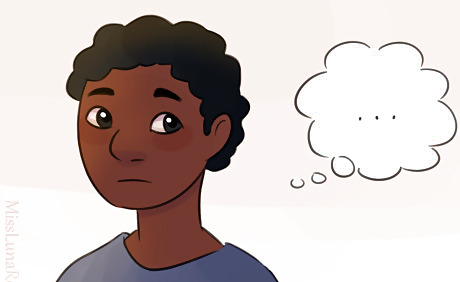
Accept that your friendship will change in unpredictable ways. Telling your friend that you have a crush on them is guaranteed to impact your relationship somehow. If they return your feelings, you'll likely begin a romantic relationship, and there's no way to know ahead of time how that will turn out. If they don't return your feelings, the relationship could become a little awkward, at least for a while. Be sure you understand and accept that before you decide to bring up your feelings. If your crush is so strong that it's hard for you to be "just friends," it's probably worth telling the other person how you feel. Those feelings will probably come out eventually anyway. If you're just starting to feel a spark of attraction towards your friend, you might consider waiting a while to see if those feelings develop more or if it's a temporary thing.

Don't obsess over every little sign your crush likes you. It can be tempting to try to find clues in everything your crush does, from the way they stand to how often they look in your eyes. However, no two people are alike. Some people are naturally flirtatious, even with their friends, while other people are very reserved, and won't give you many signs even if they like you a lot. It's fine to use the person's behavior to try to get a read on whether they're open to the idea of dating you, but don't spend too much time thinking about it. This doesn't mean you have to ignore obvious signs. For instance, if your friend regularly describes you as being like their sibling, it could be a clue they're not interested. If they're very affectionate or flirtatious around you, but not other people, it could mean they like you. Consider asking your mutual friends what your crush thinks of you. They might be able to help you decide whether you should tell your crush you like them.

Sit back for a while if you're on the fence. Don't be in too much of a rush to change your friendship. While you don't want to drag your feet forever, it's also a bad idea to charge ahead if you're not sure the timing is right or if you're still working out exactly how you feel. Focus on your friendship—if those feelings are real, they probably won't go away just because you spent a little extra time reflecting. If your feelings are really strong but you're still not sure about telling your crush, consider spending a little less time around them for a while. That can help you clarify your feelings, and if your friend has a chance to miss you, it might make them realize they have romantic feelings for you. If your friend is in a relationship or there are other reasons you don't think you could be together right now, consider dating other people for a while. However, don’t pretend to like someone else just to make your friend jealous. Don't try to bury your feelings for too long—that can lead to built-up frustration or even resentment, and it will be tempting to only see the best in your crush instead of seeing them as a whole person. Just take your time figuring out how you feel before you move forward, since the stakes are higher with an existing friendship.

Be honest with yourself about the kind of relationship you want. Ask yourself whether you're really looking for a long-term relationship, or if you're just more interested in having a good time with someone for a while. If you're not really sure you're ready to settle down, your friend might not be the best person to turn to for company. A quick fling can be fun, but you could lose a lifelong friend in return. Similarly, if you think you're ready to settle down but you know your friend isn't ready to think long-term, it might not be the best timing to move things to the next level. Hooking up does not necessarily mean leaving the friend zone. If anything, it could just make things more confusing for both of you.

Don't fall into toxic patterns of thinking. Some people feel that a close relationship with someone entitles them to a chance at romance. It doesn't. Relationships are choices, not transactions where a certain amount of favors entitles you to a specific return. They come from feelings and decisions. Don't bend over backwards for your friend and then get mad when you don't get a kiss. Your friend doesn't owe you anything. If they say no, the only polite thing to do is accept it and move on. Don't assume that your dating history defines your worth. Don't depend on other people for validation. Your primary self-worth should come from within—and if it doesn't, you aren't ready for romance. Self-care comes before people-pleasing. Don't drop everything every single time your crush has the slightest problem. Pause and check in with yourself. If helping them would cause big problems for you (e.g. not studying for an important test because you spent the whole day with them), don't jump in anyway. See if there's something reasonable you can do for them without sacrificing your own needs.Keep in mind: You doing what someone else wants does not mean that they now have to do what you want. Your goal is not to rack up "points" that you can cash in later—it's a friendship, not an arcade prize counter. You're here to find out if your friend might be interested in dating.
Flirting with Your Friend

Spend more one-on-one time together. If you normally hang out as part of a group, try to come up with ideas of things the two of you can do on your own. It doesn't necessarily have to be a formal date, at first, but spending time alone together can help build your relationship. In addition, the more time you spend one-on-one, the more of your true feelings you’ll be able to show them. For instance, you might invite your friend to do things you know they enjoy, like attending a concert, going on a hike, or playing a sport together. You could also casually invite them to go with you when you're running errands, getting a bite to eat, or going shopping.

Let your eye contact linger a little more than usual. It can feel a little awkward to start flirting with someone who's been a platonic friend. One simple way to ease into it is with eye contact. When you and your crush share a glance, smile a little, then hold their gaze about 2 or 3 longer than you normally would—any longer, and it might look like creepy staring. Then, look away, still smiling. This can make your friend feel like the two of you share a secret, so they might feel closer to you.

Break the touch barrier. Small, physical gestures can be very flirtatious, so try being more hands-on with your crush—as long as they seem comfortable with it, of course. Start small, like touching their hand when you're talking, hugging them when you see them, or leaning against their shoulder when you're standing next to each other. If they seem relaxed or return the affection, you can slowly build up from there. Increase physical contact with your friend slowly, and be respectful. If they tense up, frown, or move away from you when you touch them, stop what you're doing and consider apologizing for making them uncomfortable.
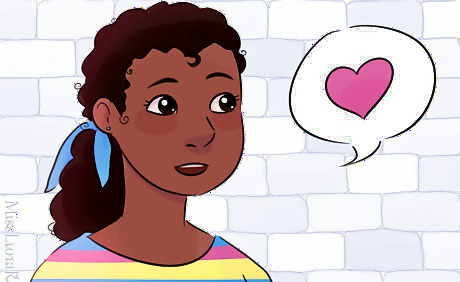
Give your crush sincere compliments. Compliments are a great way to make someone else feel good while letting them know how you feel. Try to compliment your crush on things that are unique to them—bonus points if you're complimenting their personality or style, rather than or something physical they don't have any control over. For instance, instead of saying, "You have gorgeous eyes," you might say, "I love how you light up every time you see a cute animal!" or "I love the way you always make me laugh when I'm around you!"
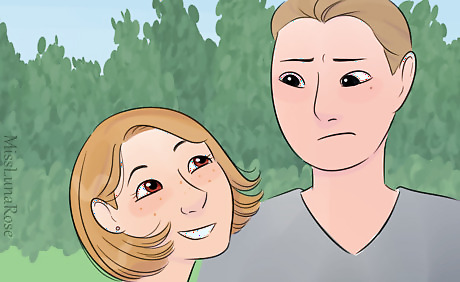
Pay attention to your friend's reactions when you flirt. Watch your friend for clues that will tell you whether they're open to your flirtatious attention. If they're relaxed, smiling, blushing, leaning into you, and making eye contact, they might have a crush on you, too! If that's the case, feel free to keep flirting with them and just see how things go. If they seem tense, uncomfortable, or upset, they might not see you in a romantic way, and it's probably better to back way off. Other signs they're not interested might be if they frequently talk about liking other people, or if they try to avoid any romantic talk altogether. If they seem a little unsure about how to act, they may just need some time to adjust to the idea, or they may be too polite to let you down. Take some time to read the situation before you proceed.
Showing You're Dating Material
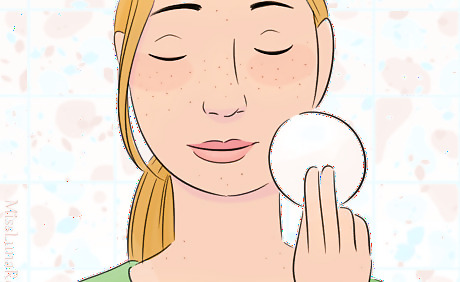
Practice good self-care. Self-care shows self-respect. (No respectable person wants to date someone with zero confidence.) Be clean and well-groomed every day. Practice good posture. An attractive person respects both themself and others. You don't need expensive clothes, perfume/cologne, or makeup. You just need basic skin care, hair care, soap, deodorant, and clothes that help you feel good about yourself and your life. Focus less on any quirks or "flaws" in your looks and more on the things you can do. Maybe you have a wonky nose, but you can take good care of your hair and dress sharply. Your attitude will also matter more than the exact looks of your nose, face, and body.
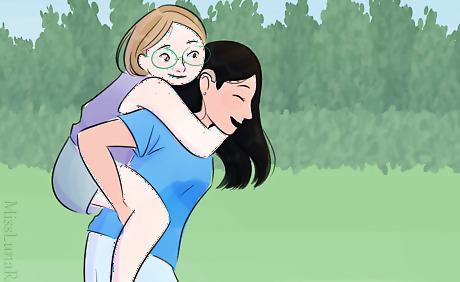
Start small and work your way up. Don’t expect your friendship to turn into a passionate romance overnight. Give the other person time to get comfortable with the idea. Go on a few casual non-dates at first, then ask for a more formal date when the time is right. Let your gestures gradually become more flirty and playful, and move up to more obvious affection later on if it feels right. If you push too much right away, you might just end up scaring them off. Learn to read your friend’s behavior. If they respond well to lighthearted flirting, it could be a good sign. If they tend to shut down or change the subject when you show affection, then they probably aren’t interested in you in that way, and it's time to find a new crush. However, don't be too subtle—part of the reason a lot of people end up in the friend zone is that they don't make it clear enough that they're interested in the other person.

Show self-worth, not self-loathing or self-pity. When you're friends with someone, it's easy to slip into self-deprecating, goofy humor where you put yourself down for a laugh. However, if you do that too often, it can make you seem insecure—not necessarily the best foundation for creating a romantic relationship. Instead, try to talk about yourself in a positive light, and your crush may be more likely to see you that way, too. For instance, don't say things like, "Nobody ever wants to date me" or, "I'll be alone forever." Instead, try saying things like, "I know there's someone out there who's going to love me for exactly who I am!" It's fine to laugh with your crush! In fact, it's ideal. Just try to remember not to make yourself the butt of the joke too often. If you're having trouble seeing what's good about yourself, it might be time to step back from the idea of dating someone for right now. Instead, spend some time figuring out what it means for you to live your best life. It's hard to have a healthy relationship if you don't understand your own worth.

Ask them for their help or advice with things. Believe it or not, your crush might actually be more inclined to like you if you give them a chance to help you out. Ask them for little favors when you get a chance, like giving you a ride somewhere, loaning you a pencil in class, or helping you with a project. You might feel like you can impress your crush by constantly doing favors for them, but a real relationship is a two-way street. Don't rush in to rescue them immediately every time. Let them ask you for help, or go ahead and ask if they want help instead of assuming.
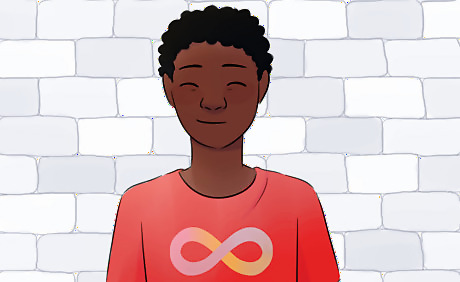
Give your friend space sometimes. While you might want to spend every waking moment around your crush, too much attention can sometimes start to make the other person feel smothered. Spend some time doing things without your crush—remember, even once you're in a relationship, it's healthy to make time for your own hobbies and interests. Even better, this might give your crush a chance to realize how much they miss you when you aren't around.
Transitioning into a Relationship

Don't wait around forever if you know what you want. Holding back feelings for months or years can hinder your relationship's future development. It's better if the two of you are at similar stages. This will make it easier to get on the same page. Delaying the confession won't make it easier. It'll be just as hard in the future as it would be this week.

Make sure the time is right before you share your feelings. When you feel like you're ready to let your crush know that you like them, try to find a quiet moment when the two of you are alone. Consider other situational details, as well—if your friend is going through a stressful time in their life or just got out of a long-term relationship, it may not be the right time to share your feelings with them. If there are other people around, your friend might be too embarrassed to be honest with you about how the feel. Avoid opening up when you're not sober. While it may give you a sense of "courage" to be super confident, neither of you can trust what is said when you're either drunk or high––and it can complicate things quickly. Reader Poll: We asked 172 wikiHow readers who've had feelings for a friend, and 70% of them agreed that the best way to confess your feelings is by having a face-to-face conversation. [Take Poll]

Be upfront about your feelings. Tell your friend that you have something you need to tell them, then explain what you want to say in a simple, heartfelt way. Then, give the other person a chance to respond if they'd like. Here are some examples: "I'm nervous about telling you this, but I have a crush on you." "We've spent so much time together and I like being around you. I have feelings for you and I just needed to tell you that." "I've had so much fun spending time with you. I admire how caring, thoughtful, and funny you are. Would you ever be interested in going on a date?" "My feelings for you have been shifting lately. How would you feel if I asked you out?"Tip: Don't turn the conversation into a long, dramatic monologue about how your life will only be complete if they're your partner. Just let them know you're interested, simply and directly.

Accept rejection gracefully if they say no. Unfortunately, sometimes in life you'll be turned down. Remember, this isn't a reflection on your worth as a person—it just means your crush doesn't see the two of you as a match. Smile and say something like, "That's okay, I just wanted to tell you," then leave it at that. Don't pressure them to try to change their mind—they've given you your answer, and it's important to respect that. Take a little time apart if needed to process your feelings. Don't push yourself to spend time with them if you still need time to heal. Decide whether you're able to put your feelings aside and continue the friendship or whether you're better off apart. Spend some time around your loved ones for support to help keep your spirits high. You might also find it helpful to write down your feelings in a journal, or you might prefer staying busy with exercise or a favorite hobby to keep your mind off of things. Remember to be proud of yourself for giving it a shot. That took a lot of courage! Even being rejected is better than spending your whole life wondering, "What if?"Keep in mind: Your friend cares about you, so it probably isn't easy for them to turn you down. Don't make it harder. Getting angry or pressuring your friend is a surefire way to throw your friendship into the toilet and prove that you couldn't be trusted in the first place.

Ask them out if they seem receptive to the idea. Once you've confessed your feelings, don't leave it open-ended—unless they turn you down right away, make it clear that you'd like to ask them on a date or that you want to be in a relationship with them. However, don't pressure the person to answer right away—let them know that it's okay if they need a little time to think about it first. For instance, you might say something like, "I think you're amazing and special, and I really want a chance to be your boyfriend."

Set new boundaries together if you start dating. If your crush is open to exploring things further, then congratulations! However, it won't necessarily be smooth sailing just because you got that part over with. As friends, certain things might have been acceptable that won't fit into a romantic relationship. Take your time negotiating these together—let them know what you are and aren't okay with, but also be a good listener when they have something to add. For instance, you might discuss how often the two of you will talk, how you'll prioritize spending your free time together, and what is and isn't okay to talk to mutual friends about. Be flexible―these boundaries may change as your relationship deepens. This is absolutely natural and normal, and it's important to talk honestly about what is and isn't working for you both. Don't worry if things are a little awkward at first. Just learn to laugh together as you get used to the changes in your relationship.

Don’t involve your mutual friends in your problems. If you have friends in common, it might be tempting to run to them whenever you and your new partner argue or disagree. However, it's not fair to your friends to use them as a sounding board—it can put them in a really awkward position, and it could do damage to your friendships and your relationship. If you're having serious problems in your relationship, it's okay to talk to someone else. However, it might be best to choose someone who isn't a mutual friend—instead, you might choose one of your close family members or someone who's been a mentor to you.

Let your crush set the pace. These feelings and ideas may be new to them. Don't pressure them to fall for you in a heartbeat. Give this new relationship the time it needs to grow and change. Listen to your crush, respect their feelings, and make this comfortable and enjoyable for both of you.












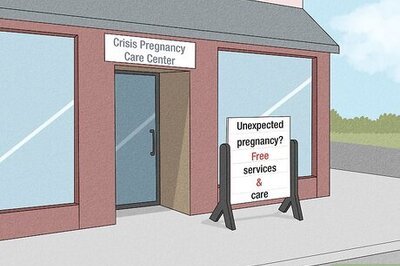
Comments
0 comment